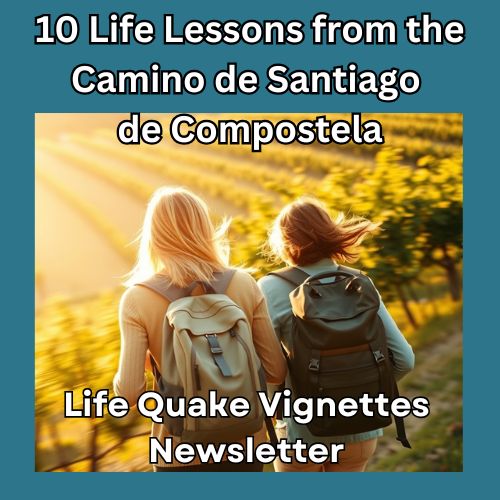Transform Your Retreat Experience: A Host’s Insider Guide to What Works
Picture this: You’ve spent months crafting the perfect retreat experience. Then reality hits like a surprise thunderstorm – someone’s using the sacred singing bowl as a cereal dish, another guest is livestreaming their “authentic journey”, and you’re wondering if enlightenment comes with a customer service manual.
After hosting dozens of retreats and collecting enough stories to fill a totally zen comedy special, I’ve learned that creating magical experiences requires a delicate balance between holding space and holding boundaries. So here’s my suggestions for retreat guests everywhere – a gentle, humour-infused guide to making retreats amazing for everyone involved.
This post refers to retreats IN GENERAL, not specifically to MY retreats.
The Do’s and Don’ts That Make All The Difference
The “Please Do” List
1. Arrive with an open heart, not an agenda Come ready to receive without expectations. The magic happens when you release the need to have a specific outcome and trust the process. Your breakthrough might look nothing like what you imagined – and that’s often when the real magic appears.
2. Respect the digital detox boundaries Yes, I know your Instagram followers are waiting for your sunflower photos, but the retreat space is sacred. When we ask for phone-free zones, it’s not because we’re digital dinosaurs – it’s because presence is a practice, and your fellow guests deserve your full attention.
3. Participate in your own way, but participate You don’t have to be the most vocal person in group discussions or share the deepest revelation in circle time. Just show up authentically. Sometimes the quiet observer contributes as much healing energy as the vocal sharer.
4. Ask questions when you’re confused There’s no such thing as a stupid question in a retreat setting. If you don’t understand why we’re doing breathing exercises at 6 AM or what “setting an intention” actually means, please ask! We’d rather explain than have you sit there feeling lost.
5. Honour your body’s needs If you need to rest instead of joining the afternoon hike, that’s not failure – that’s wisdom. Listen to your body and communicate your needs. We can’t support you if we don’t know what’s going on.
6. Engage with fellow participants kindly You’re sharing this journey with beautiful souls who are just as vulnerable and hopeful as you are. A kind word, a genuine smile, or simply holding space for someone’s tears can be profoundly healing for everyone involved.
7. Keep confidentiality sacred What happens in circle time stays in circle time. Period. The stories, struggles, and breakthroughs shared in our container are gifts of trust that must be protected.
8. Embrace the schedule and show up on time We’ve designed the rhythm of the retreat intentionally. While flexibility is important, the flow from morning meditation to evening reflection serves a purpose. Trust the container we’ve created.
9. Come prepared (but not over-prepared) Bring what’s on the packing list, but leave the seventeen self-help books at home. You’ll have plenty to process without additional homework.
10. Practice gratitude for the small moments The perfectly timed rainstorm during meditation, the way the light hits the garden at sunset, the spontaneous laughter during sharing time – these moments are the real retreat magic.
The “Please Don’t” List
11. Don’t try to therapy-coach other participants Unless you’re explicitly invited to share your professional insights, resist the urge to analyse, diagnose, or fix your fellow retreatants. Sometimes the most healing thing you can offer is simply witnessing without trying to solve.
12. Don’t compare your journey to others Sarah might be having mystical visions while you’re just trying not to fall asleep during meditation. Tom might be crying through every workshop while you’re feeling nothing. Every path is valid, every timeline is perfect.
13. Don’t break the silence during silent periods When we call for noble silence, that includes whispering, hand gestures that look like charades, and writing notes to communicate. Silence is medicine – let it work its magic.
14. Don’t dominate sharing circles While we love hearing your insights, remember that circle time is for everyone. Share generously but leave space for others to find their voice too.
15. Don’t bring drama from home Yes, your ex is still texting you and your boss is being impossible, but retreat time is for stepping away from those patterns. Use this sacred pause to gain perspective rather than rehearsing old stories.
16. Don’t be the retreat photographer Resist the urge to document every moment. Some experiences are meant to be felt, not photographed. Plus, candid shots of people in vulnerable moments aren’t consent-given keepsakes.
17. Don’t skip meals to “go deeper” Spiritual bypassing through food restriction isn’t enlightenment – it’s just hangry. Your body needs nourishment to support your emotional and spiritual work.
18. Don’t judge the accommodation as a hotel That squeaky floorboard and the shared bathroom aren’t bugs, they’re features. Retreat centres prioritise soul space over thread counts, and that’s exactly the point.
19. Don’t pressure others to share your level of openness Just because you’re ready to share your deepest traumas doesn’t mean everyone else is. Honour others’ boundaries and timelines without taking their reserve personally.
20. Don’t leave without saying goodbye The retreat community that forms is precious and temporary. Honour the connections you’ve made with conscious closure rather than Irish goodbyes.
5 Key Takeaways for Retreat Success
1. Presence Over Performance
The most transformative retreat experiences happen when you stop trying to be the “best” retreat guest and start being your most authentic self. Your job isn’t to impress anyone – it’s to show up honestly and let the process work through you.
2. Boundaries Are Love in Action
Those seemingly restrictive guidelines about phones, silence, and schedule aren’t arbitrary rules – they’re carefully crafted containers that create safety for everyone’s journey. When you honor the boundaries, you’re contributing to the collective healing space.
3. Your Resistance Is Information
Notice what you want to avoid, complain about, or escape from during the retreat. Often, our resistance points directly toward what we most need to explore. The schedule conflict that annoys you might be revealing a pattern worth examining.
4. Integration Starts During the Retreat
Don’t wait until you get home to think about how you’ll integrate your insights. Start noticing patterns, journaling observations, and identifying practices you want to continue while you’re still in the supportive container of the retreat.
5. Community Amplifies Individual Healing
The magic of retreats isn’t just in the teachings or practices – it’s in the alchemy that happens when vulnerable hearts gather in sacred space. Your healing contributes to everyone else’s, and theirs supports yours in ways you might never fully understand.
Frequently Asked Questions
Q: What if I hate something about the retreat experience? A: First, breathe. Resistance is often information about what we need to explore. Talk to the facilitators – we’d rather help you navigate challenges than have you suffer in silence. Sometimes what feels like the “worst” part of a retreat becomes the most transformative.
Q: Is it okay to skip activities if I’m feeling overwhelmed? A: Absolutely. Self-care isn’t selfish, and sometimes the most spiritual thing you can do is rest. Just communicate with the facilitators so we know you’re okay and not missing due to dissatisfaction with the program.
Q: How do I handle personality conflicts with other participants? A: Remember that everyone is doing their best with their current level of consciousness. Use conflicts as opportunities to practice boundaries, compassion, and communication. If it becomes truly disruptive, speak with the facilitators for support.
Q: What if I don’t have any big breakthroughs? A: Healing doesn’t always look like dramatic revelations. Sometimes it’s subtle shifts, moments of peace, or simply the experience of being witnessed and accepted. Trust that what you need is happening, even if it’s not what you expected.
Q: How can I make the most of my retreat investment? A: Show up fully, stay curious instead of critical, engage authentically with the community, and trust the process even when it feels uncomfortable. The retreat experience extends beyond the scheduled activities – meaningful conversations during free time can be just as transformative as formal sessions.
Conclusion
Here’s what I really want you to know: retreats aren’t about becoming a different person – they’re about remembering who you already are beneath all the layers of conditioning, fear, and busyness. Every retreat guest brings their own medicine to the circle, and your presence matters more than you realise.
The guidelines in this list aren’t meant to restrict your authentic expression but to create a container where authentic expression becomes possible for everyone. When we all lean into the collective agreement of respect, presence, and openness, something magical happens that none of us could create alone.
So come as you are, stay curious, be kind, and trust that whatever unfolds is exactly what’s meant to be. Your willingness to show up and do the work – even when it’s messy, uncomfortable, or different than expected – is already enough.
Now excuse me while I go hide the singing bowls before the next group arrives.

10 Powerful Life Lessons Learned While Walking the Camino de Santiago – a free guide filled with 10 not just “quaint anecdotes” or Instagram-worthy moments (though there are plenty of those) but real transformations from real people who walked the same insight-giving trail you might want to walk one day – Subscribe to my monthly newsletter to Download the Guide

“I am an experienced medical doctor – MBChB, MRCGP, NLP master pract cert, Transformational Life Coach (dip.) Life Story Coach (cert.) Stress Counselling (cert.) Med Hypnotherapy (dip.) and EAGALA (cert.) I may have an impressive number of letters after my name, and more than three decades of professional experience, but what qualifies me to excel at what I do is my intuitive understanding of my clients’ difficulties and my extensive personal experience of managing major life changes using strategies I developed over many years.” Dr M Montagu

